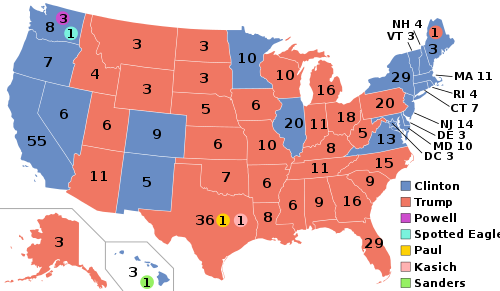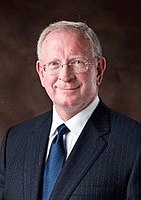2016 United States presidential election
58th quadrennial U.S. presidential election From Wikipedia, the free encyclopedia
Remove ads
The 2016 United States presidential election was the 58th presidential election that was held on November 8, 2016. Businessman Donald Trump and Indiana Governor Mike Pence defeated former U.S. secretary of State Hillary Clinton and U.S. senator Tim Kaine on the Republican Party ticket.[3]
Remove ads
Then-incumbent President Barack Obama was term limited by the Twenty-second amendment, which made him unable to serve a third presidential term. Former secretary of state Hillary Clinton won the Democratic nomination. Trump became his party's front-runner against many candidates in the Republican primary, defeating Senator Ted Cruz, Senator Marco Rubio, and Ohio Governor John Kasich among other candidates.
Many third-party candidates ran, such as Gary Johnson. Trump chose Indiana governor Mike Pence as his running mate, and Clinton chose U.S. senator Tim Kaine as her running mate.
Trump received 304 electoral votes, 34 more votes than what was needed to win, while Clinton received 227.[4] Even though Trump lost the popular vote, the electoral votes decide the actual winner of the election. Trump took office on January 20, 2017.
Remove ads
Background
Article Two of the United States Constitution says that for a person to be elected and serve as President of the United States, they must be a natural-born citizen of the United States, at least 35 years old, and a resident of the United States for a period of no less than 14 years.
Candidates for the presidency typically seek the nomination of one of the various political parties of the United States, in which case each party devises a method (such as a primary election) to choose the candidate the party deems best suited to run for the position. The party's delegates then officially nominate a candidate to run on the party's behalf.
President Barack Obama was unable to seek re-election for a third term because of the Twenty-second Amendment to the United States Constitution, which states that a president may only serve up to two terms. His term as president ended at noon eastern standard time on January 20, 2017.[5][6]
Remove ads
Democratic Party
Nominees
Withdrawn candidates
Remove ads
Republican Party
Withdrawn candidates
Wikinews has related news:
Remove ads
Major third parties
Libertarian Party

On ballot
Ballot access to all 538 electoral votes[52]
Nominees
Withdrawn candidates
- Robert David Steele, activist and author from Virginia; candidate for the Reform Party's nomination in 2012. Suspended campaign on January 6, 2016[55][56][57]
- Marc Allan Feldman, Anesthesiologist at The Cleveland Clinic (since 1998). Suspended after convention[58]
- John McAfee, businessman and computer scientist, founder of McAfee. Suspended after convention[59][60]
- Austin Petersen, businessman and founder and CEO of Stonegait, LLC. Suspended after convention. Endorsed Gary Johnson[61][62]
- Vermin Supreme, performance artist and activist; candidate for the Democratic Party's nomination in 2012 and 2016. Suspended after convention.[63]
Constitution Party
Ballot access to 207 electoral votes (451 with write-in):[64][65] –

On ballot
Write-in
Not on ballot
- As write-in: Alabama, Arizona, Connecticut, Delaware, Georgia, Illinois, Indiana, Kansas, Kentucky, Maine, Maryland, Montana, Nebraska, New Hampshire, New York, Ohio, Oregon, Rhode Island, Tennessee, Texas, Vermont, Virginia[64][66][67][68][69]
- No ballot access: California, District of Columbia, Massachusetts, North Carolina, Oklahoma
Nominees
Green Party

On ballot
Not on ballot, write-in access
Not on ballot
Ballot access to 493(451) electoral votes:[71] Ballot access currently in process: North Dakota, Rhode Island, Wyoming
States currently under litigation for ballot access: Nevada, Oklahoma
States with no ballot access: South Dakota
As write-in: Georgia, Indiana, North Carolina.[72][73]
Nominees
Other active candidates
- Darryl Cherney, Earth First! organizer and musician from California[75]
- Sedinam Curry, 29th People's National Convention organizer from California[75]
- William Kreml, Professor Emeritus of University of South Carolina from South Carolina. Endorsed Jill Stein[75]
- Kent Mesplay, Inspector at the Air Pollution Control District of San Diego County (2001-2015) from California. Endorsed Jill Stein[75]
Withdrawn candidates
- Midge Potts, transgender peace activist from Missouri. Suspended campaign during primaries[76]
American Delta Party and Reform Party

Access to ballot
Write-in
Ballot access to 147 electoral votes (305 with write-in)
- On the ballot: Alaska, Colorado, Florida, Idaho, Iowa, Kentucky, Minnesota, Mississippi, Montana, Nevada, New Hampshire, New Jersey, New Mexico, North Dakota, Rhode Island, Tennessee, Utah, Vermont, Wisconsin, Wyoming
- As write-in: Alabama, Arizona, Connecticut, Delaware, Indiana, Kansas, Maryland, Missouri, Nebraska, New York, Oregon, Pennsylvania, Virginia, Washington, West Virginia
- No ballot access: California, District of Columbia, Georgia, Hawaii, Illinois, Indiana, Maine, Massachusetts, Michigan, Nevada, North Carolina, Ohio, Oklahoma, South Dakota, Texas, Wyoming
Independents

Access to ballot
Write-in
Ballot access to 84 electoral votes (451 with write-in):[77]
- As write-in: Alabama, Alaska, Arizona, California, Connecticut, Delaware, Georgia, Illinois, Kansas, Maine, Maryland, Massachusetts, Michigan, Missouri, Montana, Nebraska, New Hampshire, New Jersey, New York, North Dakota, Ohio, Oregon, Pennsylvania, Rhode Island, Tennessee, Texas, Vermont, Washington, West Virginia, Wisconsin[77][78][79][80][81][82][83]
- No ballot access: District of Columbia, Florida, Hawaii, Indiana, Mississippi, Nevada, North Carolina, Oklahoma, South Dakota, Wyoming
Remove ads
Other parties
American Freedom Party
Ballot Access to 6 electoral votes: Mississippi[85]
Independent American Party
Ballot Access to 18 Electoral Votes: New Mexico, Oregon, Utah[88]
- Farley Anderson, activist from Utah.[88] Vice Presidential nominee: Vacant
Party for Socialism and Liberation
Ballot Access to 29 electoral votes: Florida[89]
- Gloria La Riva, newspaper printer and activist from New Mexico; 2008 presidential nominee; vice-presidential nominee: Eugene Puryear[90]
Prohibition Party
Ballot Access to 21 electoral votes: Arkansas, Colorado, Mississippi[91][92][93]
- James Hedges, Tax Assessor for Thompson Township, Fulton County, Pennsylvania 2002–2007;[94][95] vice-presidential nominee: Bill Bayes of Mississippi[94]
Peace and Freedom Party & Party of Socialism and Liberation
Ballot Access to 84 electoral votes: California, Florida[96][97]
- Gloria La Riva, newspaper printer and activist, from New Mexico[98]
Socialist Party USA
Ballot Access to 0 electoral votes[93]
Nutrition Party
Ballot Access to 9 electoral votes: Colorado[91]
Veterans Party of America
Ballot Access to 6 electoral votes: Mississippi[102]
Workers World Party
Ballot Access to 0 electoral votes
Remove ads
Battleground states
Battleground states during the election were: Nevada, Georgia, Michigan, Pennsylvania, Florida, New Hampshire, Maine, Ohio and North Carolina. Trump won Georgia, Michigan, Pennsylvania, Ohio, North Carolina, Florida and a congressional district in Maine. Clinton won Nevada, New Hampshire and Maine. Wisconsin, Michigan and Pennsylvania were seen as likely 'Blue' states, but Trump won all three states in what was seen as a political upset.
Remove ads
Party conventions
- Democratic Party
- July 25–28, 2016: Democratic National Convention to be held in Philadelphia, Pennsylvania.[106]
- Republican Party
- Green Party
- Libertarian Party
- Constitution Party
- April 13–16, 2016: Constitution Party National Convention was held in Salt Lake City, Utah.[113]
- Reform Party
Remove ads
Debates
On April 1, 2015, the Commission on Presidential Debates a (CPD) announced that each of the following 16 locations are under consideration to host one of the three presidential debates and one vice presidential debate:[115]
- Belmont University in Nashville, Tennessee
- Birmingham, Alabama
- Dominican University of California in San Rafael, California
- Eastern Kentucky University in Richmond, Kentucky
- Georgia College & State University in Milledgeville, Georgia
- Hofstra University in Hempstead, New York
- Jacksonville University in Jacksonville, Florida
- Longwood University in Farmville, Virginia
- State University of New York Rockland Community College in Suffern, New York
- University of Nevada, Las Vegas
- Washington University in St. Louis, Missouri
- West Virginia University and West Virginia State University in Charleston, West Virginia
- Wright State University in Dayton, Ohio
- Texas A&M University in College Station, Texas
- Houston Community College in Houston, Texas
- McAllen, Texas
The three locations which will host the presidential debates and the one location selected to host the vice presidential debate are to be announced by the CPD in the fall of 2015.[115][116]
Remove ads
Results
Margin of victory
- Blue shows Clinton's margin of victory over Trump, while red shows Trump's margin of victory over Clinton.
The following table shows the swing in each state compared to the 2012 election.
Notes
References
Other websites
Wikiwand - on
Seamless Wikipedia browsing. On steroids.
Remove ads
























































